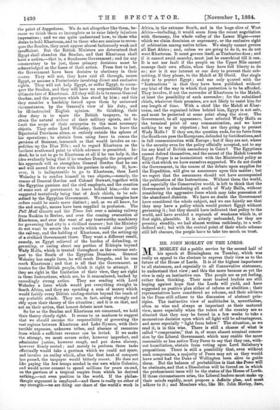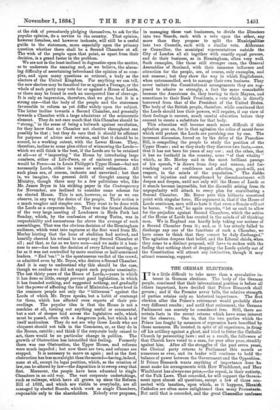MR. JOHN MORLEY ON THE LORDS.
MR. MORLEY did a public service by the second half of his speech at Birmingham on Tuesday, which was really an appeal to the electors to express their view as to the future of the House of Lords. It is of the highest importance to all statesmen, and especially to all Conservative statesmen, to understand that view ; and this the more because as yet the view is only an instinctive one. The people are as yet feeling, rather than thinking. Their most trusted leaders are still hoping against hope that the Lords will yield, and have suggested no positive plan either of reform or abolition ; their representatives have considered no scheme, and their advisers in the Press still adhere to the discussion of abstract prin- ciples. The instinctive view of multitudes is, nevertheless, often as wise and always as important as their matured view, more especially when the rulers of the country are so situated that they may be forced in a few weeks to take a momentous decision upon which all light will be advantageous, and more especially " light from below." The situation, as we read it, is in this wise. There is still a chance of what is called "compromise," that is, of some almost nominal conces- sion by the Liberal Government, which may enable the more reasonable or less active Tory Peers to say that they can, with- out humiliation, abstain from voting upon Lord Salisbury's propositions. There is still a possibility that, even without such compromise, a majority of Peers may act as they would have acted had the Duke of Wellington been alive to guide them. But the balance of probabilities is that the Peers be obstinate, and that a Dissolution will be forced on in which the predominant issue will be the status of the House of Lords. If those circumstances arise, the Liberal leaders must make up their minds rapidly, must propose a definite plan, and must adhere to it ; and Members who, like Mr. John Morley, dace,
at the risk of prematurely pledging themselves, to ask for the popular opinion, do a service to the country. That opinion, however formless, and however inchoate, will still be a useful guide to the statesmen, more especially upon the primary question whether there shall be a Second Chamber at all. The wish of the people upon that point, as apart from their decision, is a grand factor in the problem.
We are not in the least inclined to dogmatise upon the matter, or to underrate the amazing and, as we believe, the alarm- ing difficulty of ascertaining beforehand the opinion of so com- plex, and upon many questions so reticent, a body as the electors of the United Kingdom. For anything we can tell, the new electors may be fanatical for or against a Peerage, or the whole of each party may vote for or against a House of Lords, or there may be found in each an unexpected line of cleavage. It is only an impression, therefore, that we give, but it is a strong one—that the body of the people and the statesmen favourable to reform as yet differ widely upon the subject. The latter incline towards a Second Chamber, and generally towards a Chamber with a large admixture of the aristocratic element. They do not care much that this Chamber should be " strong," in the sense of being a bulwark against revolution, for they know that no Chamber not elective throughout can possibly be that ; but they do care that it should be efficient for purposes of advice and revision, and that it should be in accord, to a working extent, with the Lower House. They, therefore, incline to some plan either of winnowing the Lords— which we still think is the best, if the Lords are to be retained at all—or of " improving " the House by introducing large numbers, either of Life-Peers, or of eminent persons who would be Peers—as in Louis Philippe's Upper House—but not necessarily Lords, either in name or social estimation. All such plans are, of course, inchoate and unrevised ; but that is, we imagine, the general drift of thought among the Ministry, though there may be a few politicians who, like Mr. James Bryce in his striking paper in the Contemporary for November, are inclined to consider some scheme for an elected House. This is not, however, so far as we can observe, in any way the desire of the people. Their notion is a much rougher and simpler one. They want to be done with the Lords as a corporate body. That was the formal decision of the very large meeting of Londoners in Hyde Park last Sunday, which, by the confession of strong Tories, was in respectability and earnestness far above the average of such assemblages. That was the obvious decision of the Birmingham audience, which went into raptures at the first word from Mr. Morley hinting that the hour of abolition had arrived, and heartily cheered his refusal to accept any Second Chamber at all ; and that, so far as we have seen—and we make it a busi- ness to see—has been the decision of every Liberal meeting, so far as it was not controlled by more cautious or half-convinced leaders. " End 'em !" is the spontaneous verdict of the crowd, as admitted even by Mr. Bryce, who desires a Second Chamber. And it is easy to understand why this should be the case, though we confess we did not expect such popular unanimity. The last thirty years of the House of Lords,—years in which it has done so little, except prevent good legislation, in which it has founded nothing, and suggested nothing, and gradually lost the power of affecting the fate of Ministries,—have bred in the common people not only the " bitterness " against the Lords of which Mr. Bryce speaks, but a habit of contempt for them, which has affected even reports of their pro- ceedings. The popular idea is that the House is not a machine at all, turning out anything useful or ornamental, but a sort of sleeper laid across the legislative rails, which must be passed, often with a dangerous jerk, but which is of itself motionless. They do not see why those Lords who are eloquent should not talk in the Commons, or, as they do in the Recess, outside ; and think if the corporate body ceased to act, there would be no particular change in politics. The growth of Obstruction has intensified this feeling. Formerly there was one Obstruction, the Upper House, and reforms were much impeded ; but now there are two, and reforms are stopped. It is necessary to move on again ; and as the first obstruction has less moralright than the second—having, indeed, none at all, except its legal position, which, as the creation of law, can be altered by law—the disposition is to sweep away that first. Moreover, the people have been educated to single Chambers in an odd way. The vast corporate undertakings, such as railways, which have all grown up since the Reform Bill of 1832, and which are visible to everybody, are all managed by elected Boards, which work as single Chambers, responsible only to the shareholders. Nobody ever proposes, in managing these vast businesses, to divide the Directors into two Boards, each with a veto upon the other, •any more than they propose to split the Municipalities into two Councils, each with a similar veto. Alderman or Councillor, the municipal representatives outside the City of London all sit together with exactly equal powers, and do their business, as in Birmingham, often very well. Such examples, like those still stronger ones, the 'General Assemblies of Scotland, with their immense influence and attraction for the people, are, of course, only examples, and not reasons ; but they show the way in which Englishmen, when untrammelled, seek to manage their own business. They never imitate the Constitutional arrangements they are sup- posed to admire so strongly, a fact the more remarkable because the Americans do, they leaving to their Mayors, and sometimes to their Bank Presidents, a veto which is directly borrowed from that of the President of the United States. The body of the British people, therefore, while convinced that the Lords should lose their powers, will require, if our view of their feelings is correct, much careful education before they consent to create a substitute for that body.
This education will become much more difficult if this agitation goes on, for in that agitation the relics of moral force which still protect the Lords are perishing one by one. The incessant discussion, forced on by the delay of the Franchise Bill, is compelling the people to study the position of the Upper House ; and as they study they discover two facts,—one, that it has not been for years of any use ; and the other, that it has no foothold in the country, none "of that vitality " which, as Mr. Morley said in the most brilliant passage of his speech, " is drawn from deep and unseen, and far- reaching roots of confidence and affection, good-will, and respect, in the minds of the population." The dislike born of injustice and strengthened by disenchantment will deepen and deepen, until not only will the House of Lords as it stands become impossible, but the discredit arising from its unpopularity will attach to every plan for contributing a Second Chamber. Mr. Bryce puts this hitherto unnoticed point with singular force. His argument is, that if the House of Lords continues, men will so hate it that even a Senate will not be borne. "Do not," he again remarks, "let us omit to allow for the prejudice against Second Chambers, which the action of the House of Lords has created in the minds of all thinking men. We in England can hardly help taking our notions of a Second Chamber from it ; and, as it has utterly failed 'to discharge any one of the functions of such a Chamber, we have come to think that they cannot be duly discharged." The agitation deepens that belief, and the Liberal chiefs, when they come to a distinct proposal, will have to reckon with the feeling that nothing short of dropping the Lords quietly out of the Constitution will attract any instinctive, though it may attract reasoning, support.















































 Previous page
Previous page